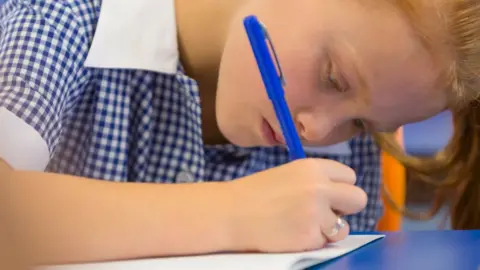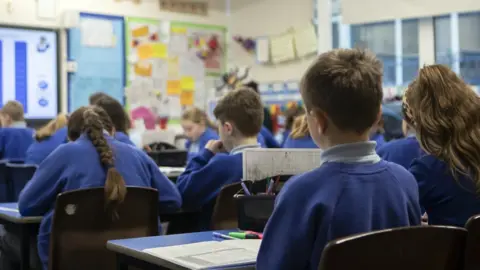No decision on all primary years back to school
 Getty Images
Getty ImagesThere is still no decision on whether all primary children will really be asked back to school next month, schools minister Nick Gibb told MPs.
After the first wave of pupils return on 1 June in England, ministers aim for all primary year groups to go back for four weeks before the end of term.
Mr Gibb was pressed by MPs on the education select committee whether this full return in mid-June was "unlikely".
"It is difficult to say," the minister told the select committee.
The minister for school standards was challenged by MPs about whether plans to bring all primary year groups back into school for the last month of term were still going ahead.
"Is it unlikely that the government's ambition for all children in primary school to return before the summer is going to happen?" asked committee chair, Robert Halfon.
"I think you need to give some steer," Mr Halfon urged the minister.
"It is difficult to say. It will be totally led by the science," said Mr Gibb.
He told MPs the decision - which would mean more than another two million children returning to primary school - would depend on the level of coronavirus infection over the "next few weeks".
Head teachers, uncertain about what they should be planning, have questioned the plausibility of accommodating all years in primary school, when they will be limited to 15 pupils per classroom.
Committee member Christian Wakeford MP said that in some schools there was "literally no room" for that to be done safely.
The minister suggested there could be a rota system - but also spoke of the importance of full-time lessons so that parents would be able to go to work.
"It's better for children to have full-time education consistently, " he told MPs.
Mr Gibb was challenged over whether the row over Dominic Cummings had damaged the credibility of the government's health messages - which could reduce trust in the safety of returning to school.
"The government's message has been undermined - and even though the law may not have been broken, the spirit of the law has indeed been broken," said Conservative MP Jonathan Gullis.
He asked how the Department for Education could "rebuild and regain confidence".
Mr Gibb said that: "The reason we can even have this discussion is because of the success of people's commitment to social distancing."
He told MPs: "The more we all adhere to the rules the more that we'll be able to make further progress in reopening schools."
There were later warnings about public trust being undermined from the Early Years Alliance, representing nurseries, pre-school providers and child minders.
Chief executive Neil Leitch said childcare providers were working hard to reopen and were concerned their efforts were going to be damaged by the Cummings row, with parents losing confidence in the credibility of the government's safety assurances.
"Anything that erodes public faith in the government's public health messages - and, in turn, risks damaging parents' trust in the government's rationale for asking childcare providers to reopen - is of course going to be of concern," he said.
Sats, GCSEs and A-levels
Mr Gullis, a former teacher, went on to tell Mr Gibb at the committee hearing that he was "baffled" that the DfE had not opted to bring back Year 5 age group in England, seeing as they faced national curriculum tests, or Sats, next year.
Mr Gibb said Sats were primarily an accountability measure for primary schools and were "not qualifications for young people like GCSEs and A-levels - they're not qualifications that that affect their future".
"No-one asks how young people did in their Sats like they do GCSEs, A-levels, degree and technical qualifications."
 PA Media
PA MediaMPs also raised concerns that boys and children from ethnic minorities in Years 11 and 13 - who will receive their GCSE and A-levels results on the basis of teacher predictions and rankings - might be unfairly disadvantaged because of unconscious bias.
Mr Gibb said he and the exams watchdog, Ofqual, had consulted widely and had devised a system that was "the best way to deliver fair results".
"Ultimately, the head teacher will sign off that calculated, estimated grades are fair and right and that the rank order of pupils is fair and right.
"The onus is on teachers to be as fair and accurate as they can be and, given their professionalism, I'm sure they will be."
Committee chair Mr Halfon asked if children in Years 11 and 13 would receive any help from their school if they opted to take resits in the autumn.
"For many young people retaking their GCSEs, it will be about revision, I'm afraid, at home and it will depend on the relationship that they have with their school, particularly if they've left," Mr Gibb said.
"Some won't have have left, some will be going into the sixth form in the school and will still have the relationship with the school.
"But these are issues that we are addressing because we want to make sure that this system is as fair as possible for all young people."
Mr Gibb also revealed that he was having discussions about possible summer school catch-up sessions.
"We are talking to the sector, to education charities, to those engaged in teacher training and so on, with a view to coming forward with a package of catch-up over the summer.
"I'm being a bit coy with details because we are still having these discussions now and we will be able to say something fairly soon about the outcome of those discussions."
Asked about the problems many families faced over the free school meal vouchers, Mr Gibb acknowledged the scheme had had "a bumpy start", but said it had delivered millions of pounds worth of food.
The cost of the national voucher scheme would be met by the department over the half term break, he said.

- A SIMPLE GUIDE: What are the symptoms?
- RISK AT WORK: How exposed is your job?
- HOW A VIRUS SPREADS: An explanation
- RECOVERY: How long does it take to get better?


Is your child going back to school on 1 June? Share your thoughts by emailing [email protected].
Please include a contact number if you are willing to speak to a BBC journalist.
- WhatsApp: +44 7756 165803
- Tweet: @BBC_HaveYourSay
- Send pictures/video to [email protected]
- Upload your pictures / video here
- Please read our terms & conditions and privacy policy
